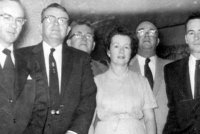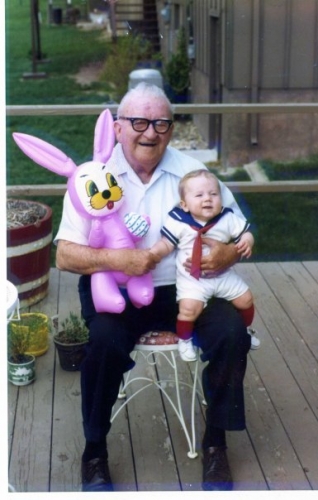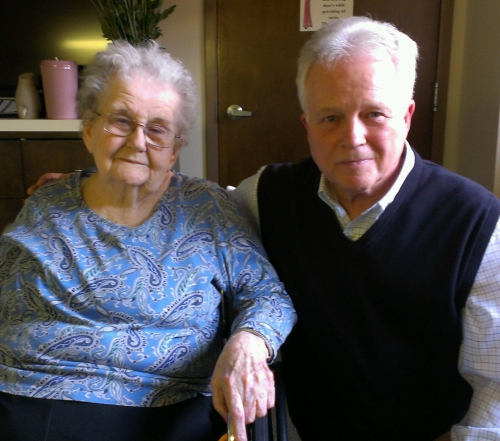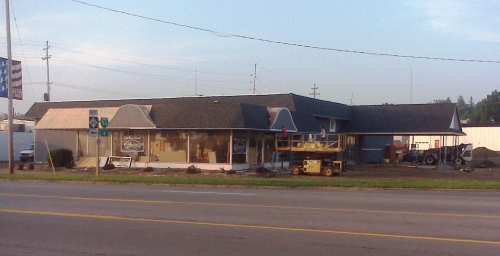“Mr. Mac”
By Jim Richmond
To some, he was known as “Teddy Mac,” to others, just “Teddy,” but at work, it was strictly “Mr. Mac.”
He was “Uncle Teddy,” (McNamara) to me.
The McNamara’s, a first and second generation Irish immigrant family, lived in the small, river bluff town of Atchison in northeast Kansas, moving there after a short time on the kin’s Begley family farm in nearby Potter, Kansas.
Photo Caption: (left to right) Bobby, Jimmy, Teddy, Mary, Tommy and Johnny McNamara. Photo taken in Atchison, at their father’s Catholic funeral. About 1956.
Teddy was one of five brothers – Jimmy, Tommy, Bobby, Johnny – raised largely during teen years by their Irish widower of a father, Thomas
and small, red-headed sister Mary, who had to “step up” at age 13, when wife and mother, Anna Martha Begley McNamara, died after a long TB wasting.
Anna died in the upstairs bedroom of their small house on Parallel Avenue.
Husband, Thomas was to lose his job with the Atchison, Topeka and Santa Fe Railroad engine repair yard. Yet, through it all, he kept the family together.
Shortly after her mother's death, little Mary broke both her arms. The doctor put her on the kitchen table in the McNamara house, tried to straighten and then set her arms. But they would remain crooked the rest of her life.
Mary dropped out of high school for awhile to help manage household chores, do the laundry, housekeeping and cooking for her father and unruly band of five brothers.
The McNamara brothers were Irish to the core -- lovers of life, family, Catholic faith, and “tip and taste of the brew.”
Mary said that -- except for soft hearted and especially considerate Tommy -- her brothers had a bit of the Irish devil in and about them. It was a challenge for the young girl to care for six men in the home.
Teddy McNamara was especially loved by the young ladies in Atchison, Mary recalled, in a 1992 videotaped interview, when she was 77.
“Oh, Teddy also kept Pop on his toes, trying to keep track of him,” Mary said with a laugh.
One Sunday morning, Teddy told his dad he was off to attend Catholic Mass. Just an hour later, Pop McNamara ran into a neighbor while shopping in downtown Atchison.
“Good morning, Thomas,” the neighbor said. “Sure and enough, I just saw your Teddy watering the grass front of that tavern by the river.”
To keep up with the ladies, and in order to afford decent clothes in his poor Irish family, young Teddy Mac also changed jobs frequently and acquired a talent for selling almost anything, to anyone, Mary recalled.
He had a short-lived job selling bedroom furniture. Teddy was about to close a mattress sale with his own dad. “But he wanted Pop to pay full price and full commission,” Mary chuckled.
Later in life, Teddy became somewhat of a business legend in Kansas City for his detailed knowledge, skills and toughness in purchasing fresh vegetables and frozen food items that were then, in turn, sold to area restaurants, hospitals and retail outlets by Pisciotta’s Frozen Foods and Vegetables, an Italian family business.
While the Italians owned and ran the business, with a fleet of trucks and warehouses, everyone called Teddy McNamara, “Mr. Mac,” out of respect for his buying and selling talents and contributions to the business’s success.
He was Pisciotta’s purchasing manager, and knew good bananas from bad like no other, and how to turn around and sell a train load of frozen French fries, hardly before the train had arrived in the Kansas City station.
It was said that no one could barter or buy like “Mr. Mac.”
I was about 17 when he got me an after-school job at Pisciotta’s.
I’d ride the bus from De La Salle Academy to the business’s location near the farmers’ market, in the “river bottoms” north of downtown Kansas City.
For a couple dollars an hour, I’d sort blue copy invoices, help the office staff, and any small errand “Mr. Mac” or “W.E.” Pisciotta (the family scion and business’ CEO) might have for me.
I valued the job, and learned by watching Uncle Teddy and the Italians.
And while Uncle Teddy and I were Irish, the Pisciottas treated us – like most of their employees – more like members of their extended Italian family.
Several times, W.E. gave me cash advances so I could buy a new refrigerator, or other big ticket item, for my mom on her birthdays – deducting $15 from my weekly paycheck to pay him and Pisciotta’s back.
Well before my own teenage years, all but Tommy of the McNamara brothers had moved from Atchison to Kansas City or elsewhere. (Mary met and married Charles E. Richmond in Atchison, and the couple relocated to Kansas City, where they raised their family.)
On many Saturdays, Teddy, Johnny and Bobby would show up at our house, getting out of one car en masse for an unscheduled visit, with a six pack of beer and heads full of blarney.
More often than not, Teddy would also have a crate of free Pisciotta groceries and vegetables for my Mom.
Mom always had a place at our Kansas City home, table and in her heart for her brothers. And they, in turn, treated her with a quiet deference and solicitude that probably had something to do with the Atchison years and her help in raising them.
Living in Kansas City, Teddy and his nurse wife Delores raised three daughters, Gerri, Kathy and Jeannie.
The girls roughly paralleled the ages of me, my twin brother John and older sister, Martha. So we saw a lot of the Teddy McNamaras in Kansas City.
Gerri tells me she and her sisters thought we lived in “a mansion,” while I recall our place on Coleman Road as a nice, but modest three bedroom home.
Memories of youth are in the eye of the beholder, because, in turn, I remember Uncle Teddy, Aunt Delores and their girls always had lots and lots of food, and bottled soft drinks when we visited their home. (Bottled soft drinks were a rarity at our house, reserved for special occasions. Our three cousins seemed to have all they wanted, whenever they wanted it. Big time distinctions for kids in the early to mid 1950s!)
The McNamara brothers, and sister Mary, have long since died.
Starting with Tommy, in Peoria at age 40 of a heart attack and with a young family, and ending with Mary, at 88, in 2003, they dropped like the individual petals from a bright green shamrock.
Irene McNamara, Tommy's widow, at age 92, is the last of the generation and still lives in Peoria with four of her five children, and scores of grandchildren.
After Teddy’s funeral, we followed the casket and the long line of cars from Church to the Catholic cemetery and then to the gravesite.
It was a cold, blustery day.
After the service, I turned with the crowd of mourners, heading back alone, I thought, to my car.
Next to me, walking slowly up the cemetery road was W. E. Pisciotta – still the “boss” but much older, Italian good looks misshapen by age and illness. He was breathing hard as we inched toward the cars together.
I felt honored for the moment with him, remembering from my youth his business skills, his family’s open heart to their employees, his personal generosity to me.
“Jimmy, your Uncle was somebody special,” W.E. said, simply.
We walked on silently in the chill, and parted.
W.E. was a man of few words, great presence. His six words that day imprinted on my mind, remaining for 40 years.
He, too, did not live much longer, after our cemetery road meander.
And while Uncle Teddy, “Mr. Mac,” his Irish brothers and my mom are gone, they have left, in their places, several blossoming generations of McNamaras, plus extended relatives with melting pot names like Borkowski, Richmond, Goble, Van Meter, Dunwiddie, Jertson and Meyer. And many carry on the Irish traditions a bit, remembering their own versions of stories about Atchison, and the McNamara’s brothers and sister who came before them.
Teddy -- “Mr. Mac” -- will always be a special uncle: An Irish Uncle with character, guts, humor, talent, and love of family.
He knew a lot about bananas and French fries.
He taught a lot more about selling, dealing with people of different backgrounds, races and cultures, and what it means to be a standup guy.
“Mr. Mac” left a legacy, and me with lots of great memories. 
Photo Caption: Teddy McNamara , with Grandson Jon VanMeter
============================================================
Update, 4.15.2013. Below, the author, Jim Richmond, visits with his Aunt Irene McNamara recently in Peoria. At age 92, she is the last of her generation of McNamaras.

